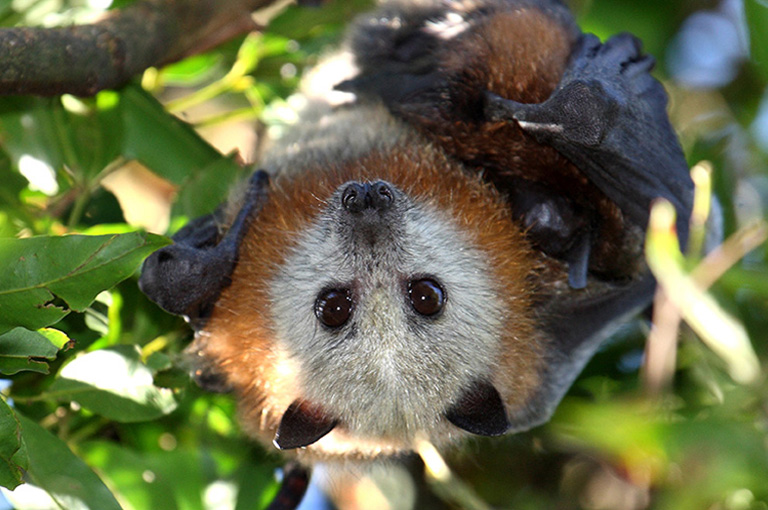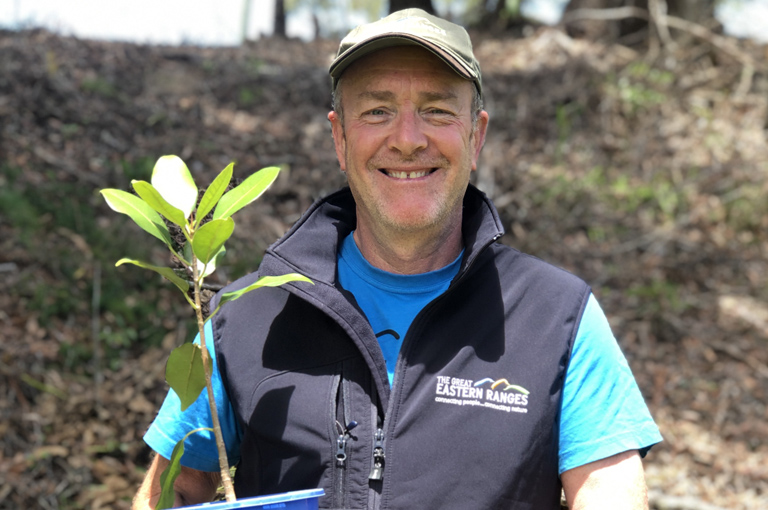
The future of the Bellingen Shires’ flying foxes will soon be looking greener thanks to a new community-led project to restore preferred bat food trees and raise awareness in local schools.
The picturesque village of Bellingen on the Mid North Coast of NSW is home to several colonies of the nationally threatened grey-headed flying fox. With an impressive wingspan measuring up to a metre, these megabats are intelligent, social animals that live in large colonies, sometimes numbering in the tens of thousands.
Like other animal pollinators, flying foxes are intimately connected with the health of our native forests, spreading the pollen and seeds of over 100 species of flowering and fruiting trees over vast distances. In a single evening, a grey-headed flying-fox covers an average of 40km, spreading up to 60,000 seeds as it flies.
But the ongoing loss of flowering trees in south-eastern Australia is leading to critical food shortages for the bats, particularly in winter and spring. This loss of food and habitat, along with the impacts of climate change, is resulting in a concerning drop in the number of all four of Australia’s flying fox species and is forcing the bats into urban areas bringing them into conflict with people.
“After three years of drought, our flying foxes were really struggling last year. Individual bats from the Bellingen Island colony were found by themselves in trees in the village in the middle of the day, too exhausted to return to their roosts. They were just feeding on whatever they could find, whilst others were lying dead on the road. It was absolutely heart-breaking,” says Kevin Evans, Board Member of the Great Eastern Ranges Initiative.
It was witnessing this distressing sight that spurred Kevin to initiate ‘Bello Gives a Fig’, a project to ramp up restoration of the Bellingen-Shires’ forests and build the empathy and support of the shire community.
Though the verdant Bellingen Valley may appear a diverse, healthy landscape, a closer look reveals that it in many areas tree cover is dominated by introduced species, particularly camphor trees and privet. The government gifted the trees to schools to plant on Arbor Day and to farmers to provide shade for their cattle after extensive logging in the valley. Though attractive, camphor trees do not provide habitat or food for the region’s struggling flying fox colonies and dense stands of trees outcompete native vegetation.
“Along with drought which has affected flowering of the native trees that flying fox feed on in the Bellingen Valley, they have to fly further and further afield to get it. We need to be putting biodiverse plantings back into the landscape closer to the flying fox camps. This requires a long-term strategy that focuses on replacing introduced tree species with more appropriate plantings that will provide reliable food and habitat for the bats in the future,” says Mr Evans.
Bellingen is a progressive community with a relatively good relationship with its flying fox camps and I wanted to ensure that the community didn’t go backwards in its relationship with our bats when they can least afford it.”
“We will therefore be working with local schools to educate the kids on the vital role that flying foxes play in ensuring healthy forests and agriculture as well as on the importance of wildlife corridors for helping to ensure our bats and other wildlife thrive.”
As part of Bello Gives a Fig, the children will help to collect the seeds of preferred local bat feed trees, grow them in their schools and then plant them on public lands to create corridors of prime flying fox foraging habitat to replace introduced camphor trees.
The plantings will also benefit a host of other local wildlife that share similar food and habitat needs, including koalas and rose-crowned fruit doves.
The Bellingen Valley is part of GER’s regional partner network, the Jaliigirr Biodiversity Alliance. The diverse and complex Jaliigirr landscape provides an important regional link in the Great Eastern Ranges.
Bello Gives a Fig is funded through a grant from the Bellingen Shire Council and is being supported by GER.




 Article
Article